What is the definition and meaning of Consciousness? Consciousness, in the realm of spiritual science, encompasses the awareness and understanding of our existence beyond the physical realm. It acknowledges the interconnectedness of all beings and the universe at large. Unlike conventional scientific approaches, which view consciousness as a product of the brain, spiritual science recognizes consciousness as a fundamental and universal energy that permeates all aspects of life.
Understanding Consciousness from the point of view of David R Hawkins
According to David R. Hawkins, Consciousness is defined as the awareness of existence, the understanding of reality, and the ability to perceive phenomena both internally and externally. It encompasses all aspects of human experience, including thoughts, emotions, sensations, and intuition. Consciousness is not limited to the human mind but is inherent in all living things and permeates the entire universe. It is the fundamental fabric of reality and is the source of all meaning and purpose in life. Consciousness is a field of infinite potentiality and creativity, and its expansion is the key to personal and collective evolution.
Consciousness can be defined as "the awareness or recognition of the existence, meaning, and purpose of everything in the universe, including ourselves. It is the ground of all being, the ultimate reality, and the source of all existence. Consciousness is all-encompassing and unifies all experience, transcending the limitations of the physical world and the boundaries of time and space."
Hawkins also emphasizes that Consciousness is not a concept or an object that can be grasped intellectually, but rather a direct experience that transcends thought and sensory perception. It is the underlying essence of all existence and the source of all creativity, intelligence, and wisdom.
Through his research and writings, Hawkins has developed a model of the levels of Consciousness, which he calls the "Map of Consciousness". This map ranges from the lowest levels of consciousness such as Shame, Guilt, Apathy, and Fear, to the higher levels of Love, Joy, Peace, and Enlightenment. According to Hawkins, each level of Consciousness has a corresponding level of energy, vibration, and frequency, which influences our perception of reality and the way we experience life.
Overall, Consciousness is a central theme in David R. Hawkins' work, and he sees it as the key to unlocking our full potential and realizing our true nature as spiritual beings.
These are some direct quotes regarding the definition of consciousness taken from David R Hawkins' book: Daily Reflections from Dr. David R. Hawkins_ 365 Contemplations on Surrender, Healing, and Consciousness (2022, Hay House) :
"Consciousness is the irreducible substrate of the human capacity to know or experience, to perceive or witness, and it is the essence of the capacity for awareness itself. It is the formless, invisible field of energy of infinite dimension and potentiality, and the foundation of all existence. It is independent of time, space, or location, yet all-inclusive and all-present."
"Consciousness is the unlimited, omnipresent, universal energy field, carrier wave, and reservoir of all information available in the universe—and, more important, it is the very essence and substrate of the capacity to know or experience. Even more critically, consciousness is the irreducible, primary quality of all existence."
"Consciousness is an impersonal quality of Divinity expressed as awareness and is nondualistic and nonlinear. It is like infinite space that is capable of awareness and a quality of the Divine essence."
Understanding Consciousness from Erwin Schrodinger point of view
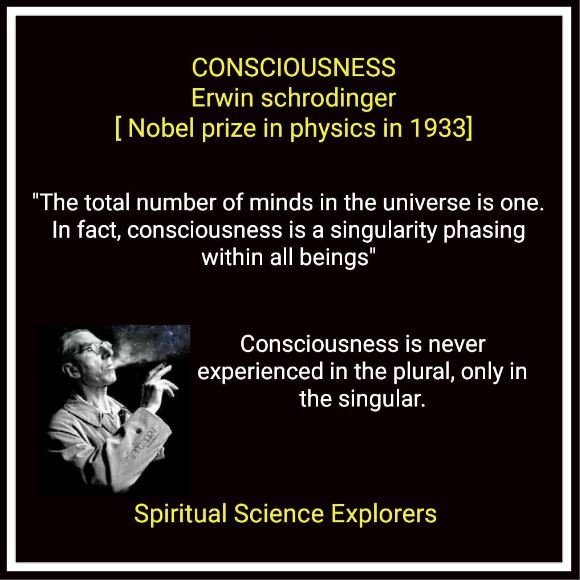 |
| Consciousness Erwin Schrödinger |
Erwin Schrödinger, the renowned physicist and Nobel laureate, made significant contributions to our understanding of consciousness. He delved into the depths of this enigmatic phenomenon, offering profound insights that challenged conventional scientific perspectives. Schrödinger's view of consciousness transcended the notion that it was a mere byproduct of physical brain activity. Instead, he posited that consciousness was fundamental and irreducible, an intrinsic aspect of the universe itself.
According to Schrödinger, consciousness could not be fully explained or reduced to materialistic or mechanistic processes alone. He believed that there was something deeply mysterious and ineffable about our subjective experience of awareness. Schrödinger argued that consciousness could not be accounted for solely in terms of the physical world but required a more comprehensive framework that embraced its fundamental nature.
Schrödinger envisioned consciousness as a universal field of awareness that pervades all of existence. It was not confined to individual minds but rather interconnected, forming a collective fabric of consciousness that transcended the boundaries of time and space. He saw consciousness as a unifying force that intimately connected us with each other and the world around us.
While Schrödinger recognized the challenges in studying consciousness using traditional scientific methods, he emphasized the importance of exploring it through alternative approaches. He believed that a deeper understanding of consciousness would require a paradigm shift in our scientific inquiry, one that integrated the subjective experiences of consciousness with objective observations.
For Schrödinger, consciousness held profound implications for our understanding of reality. He saw it as the key to unraveling the mysteries of the mind, human existence, and our place within the larger cosmic order. It offered a pathway to explore the interconnectedness of all things and to bridge the gap between the physical and the metaphysical.
Schrödinger's insights continue to inspire and challenge scientists, philosophers, and spiritual seekers alike. His exploration of consciousness opened up new avenues of inquiry, encouraging us to contemplate the profound nature of our subjective experience and our relationship with the universe. Through his work, Schrödinger urged us to embrace a more holistic and inclusive approach that honors the mysteries of consciousness and recognizes its pivotal role in shaping our understanding of ourselves and the world we inhabit.
Understanding Consciousness from Max Planck's point of view
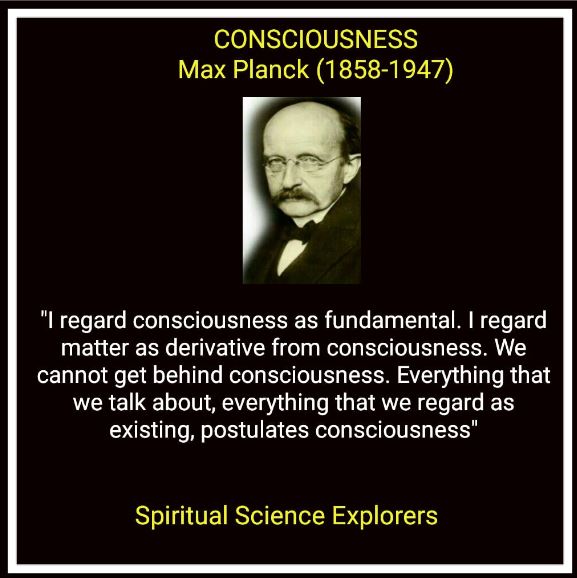 |
| Consciousness Max Planck |
Max Planck, the eminent physicist and the father of quantum theory, delved into the nature of consciousness, offering intriguing insights that challenged conventional scientific paradigms. Planck saw consciousness as an integral part of the fabric of reality, extending beyond the realm of physical phenomena. He posited that consciousness played a foundational role in our understanding of the universe and its laws.
According to Planck, consciousness was not a byproduct of purely materialistic processes but rather an inseparable aspect of existence itself. He believed that consciousness could not be explained solely through the lens of classical physics but required a more comprehensive framework that embraced the principles of quantum theory. Planck acknowledged the limitations of our scientific methods in fully grasping the intricacies of consciousness, as it involved subjective experiences that extended beyond objective observations.
For Planck, the relationship between consciousness and the physical world was intertwined in a profound manner. He recognized that the act of observation, inherent in scientific inquiry, was intrinsically linked to the conscious awareness of the observer. This understanding led him to propose the observer effect, which highlights how the act of observation itself influences the observed phenomenon. Planck emphasized that our conscious participation in the process of scientific exploration was not a passive endeavor but an active engagement that shaped our understanding of reality.
Planck's viewpoint underscored the intricate interplay between consciousness and the fundamental nature of reality. He believed that consciousness provided a unique vantage point from which to comprehend the intricate workings of the universe. In his view, consciousness was not limited to human beings alone but was an inherent aspect of the cosmos, pervading all levels of existence.
While recognizing the challenges in comprehending consciousness fully, Planck's insights ignited a shift in scientific thinking. His exploration of quantum theory paved the way for a deeper understanding of the profound connection between consciousness and the physical world. Planck's perspective continues to inspire scientists and philosophers to delve into the mysteries of consciousness, encouraging us to explore the boundaries of our current scientific frameworks and embrace new perspectives that honor the intricate relationship between consciousness and the universe.
In essence, Planck's perspective on consciousness invites us to question the prevailing assumptions about the nature of reality and to consider the profound role that consciousness plays in shaping our understanding of the universe. By acknowledging the inseparable link between conscious awareness and the physical world, we embark on a journey that challenges the boundaries of scientific inquiry and opens new avenues of exploration into the depths of human consciousness and its connection to the fundamental fabric of existence.
Understanding Consciousness from David Bohm's point of view
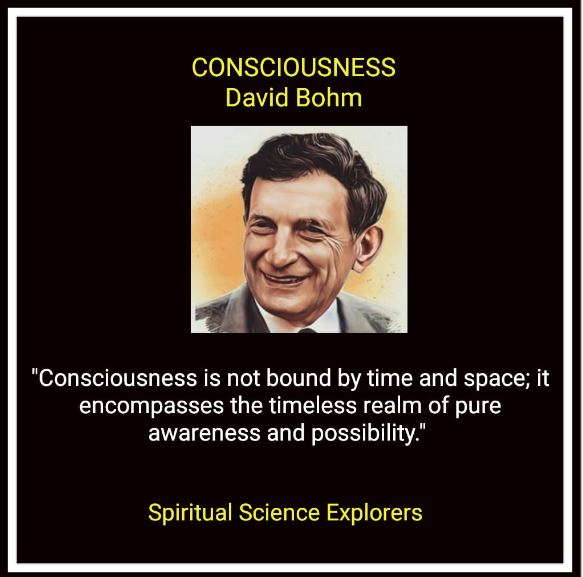 |
| Consciousness David Bohm |
David Bohm was a physicist and philosopher who was interested in understanding the relationship between the physical world and human consciousness. In his thinking, Bohm argued that consciousness is not only the ability to process information and respond to stimuli from the outside world, but also the ability to understand and be aware of the larger whole.
According to Bohm, the world we experience is made up of various separate and distinct parts, but in reality, everything is interconnected and forms a larger unity. He called this the "holistic order" or "implicate order," which contains information and knowledge that is deeper and more hidden than the order that is seen explicitly.
Bohm believed that human consciousness plays an important role in accessing this implicate order, so that we can expand our understanding of the world and become aware of the interconnectedness of everything. He argued that consciousness is not only related to an individual's mind or brain, but is also a feature of the entire universe.
In Bohm's view, consciousness is also related to the ability to engage in true and deep dialogue. He developed the concept of Bohmian dialogue, which emphasizes the importance of listening carefully, respecting others' views, and thinking creatively and openly. In this context, consciousness can help us understand others' perspectives and reach a deeper understanding of the world and ourselves.
Bohm also developed the concept of "holomovement," which refers to the idea that everything in the universe moves and changes holistically and cannot be separated into separate parts. This concept is Bohm's way of explaining how the implicate and explicate orders interact with each other in the universe.
Overall, in his thinking, Bohm argued that a deeper understanding of consciousness and the interconnectedness of oneself and the world around can help us achieve greater wisdom and a broader understanding of the universe.
Conclusion
So we can conclude:
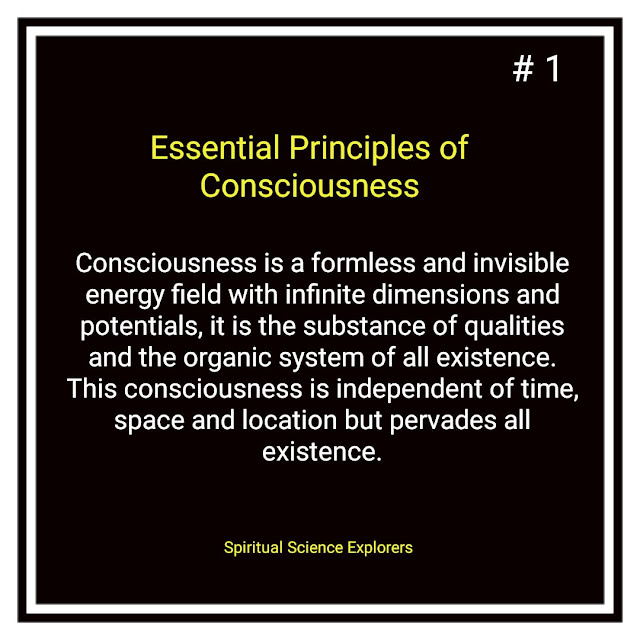 |
| Definition of Consciousness 1 |
- Consciousness is a formless and invisible energy field with infinite dimensions and potentials, it is the substance of qualities and the organic system of all existence. This consciousness is independent of time, space and location but pervades all existence.
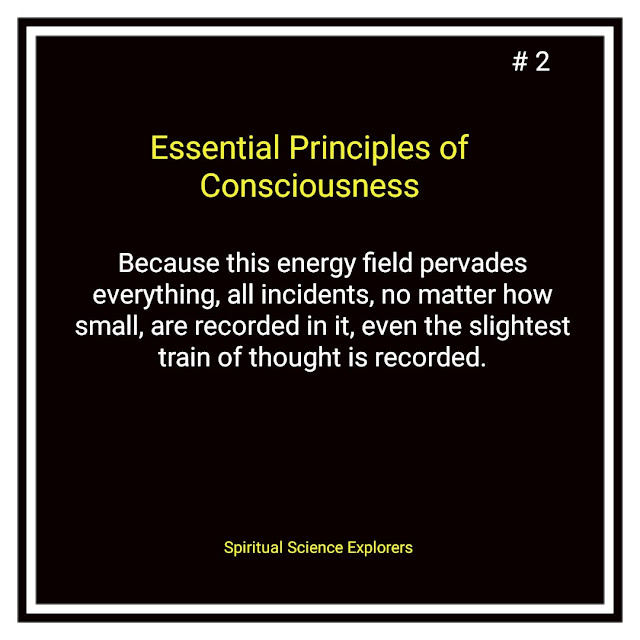 |
| Definition of Consciousness 2 |
- Because this energy field pervades everything, all incidents, no matter how small, are recorded in it, even the slightest train of thought is recorded.
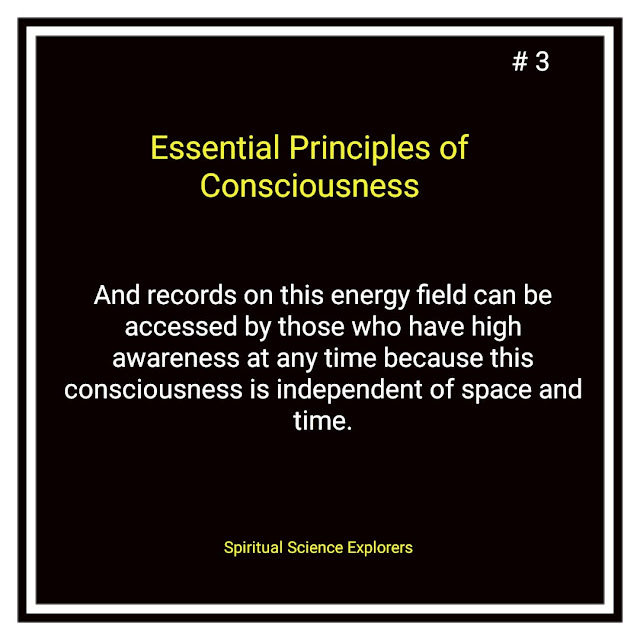 |
| Definition of Consciousness 3 |
- And records on this energy field can be accessed by those who have high awareness at any time because this consciousness is independent of space and time.
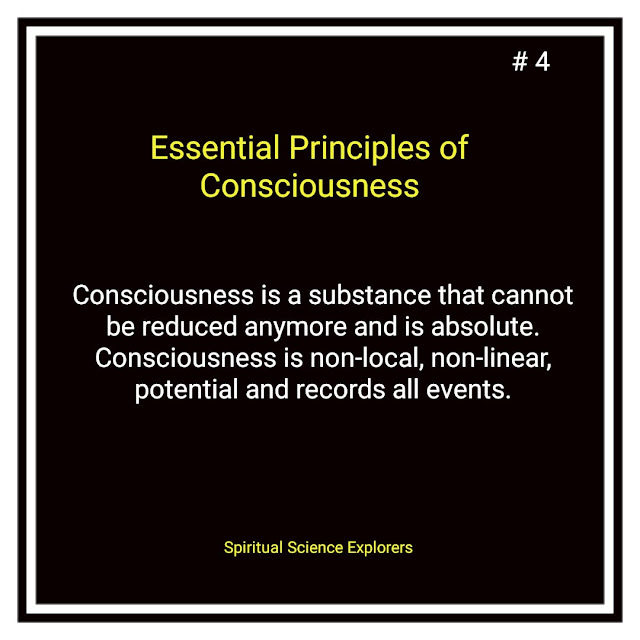 |
| Definition of Consciousness 4 |
- Consciousness is a substance that cannot be reduced anymore and is absolute. Consciousness is non-local, non-linear, potential and records all events.
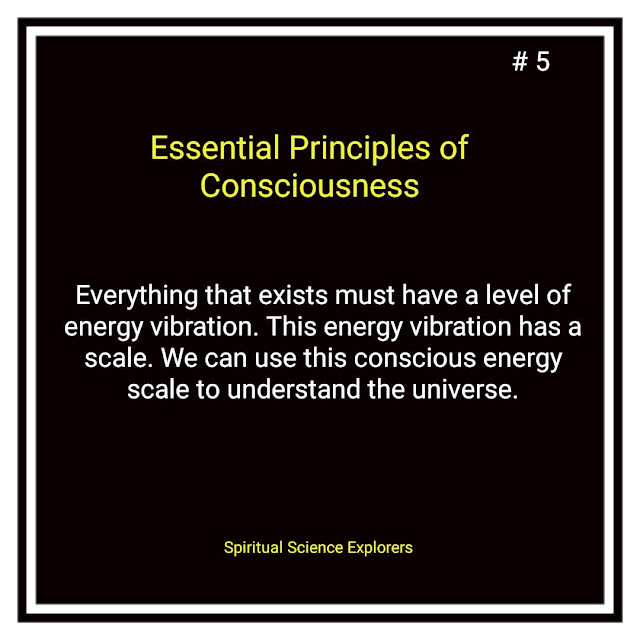 |
| Definition of Consciousness 5 |
- Everything that exists must have a level of energy vibration. This energy vibration has a scale. We can use this conscious energy scale to understand the universe.
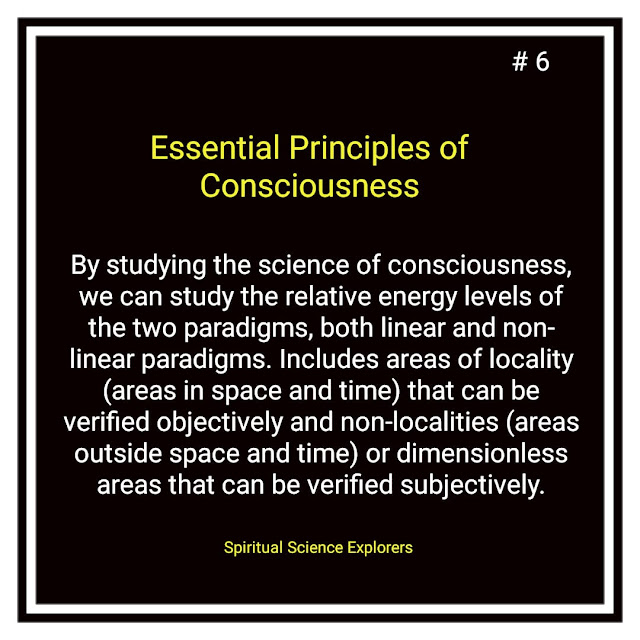 |
| Definition of Consciousness 6 |
- By studying the science of consciousness, we can study the relative energy levels of the two paradigms, both linear and non-linear paradigms. Includes areas of locality (areas in space and time) that can be verified objectively and non-localities (areas outside space and time) or dimensionless areas that can be verified subjectively.









Post a Comment for "Definition of Consciousness in the Paradigm of Spiritual Science"